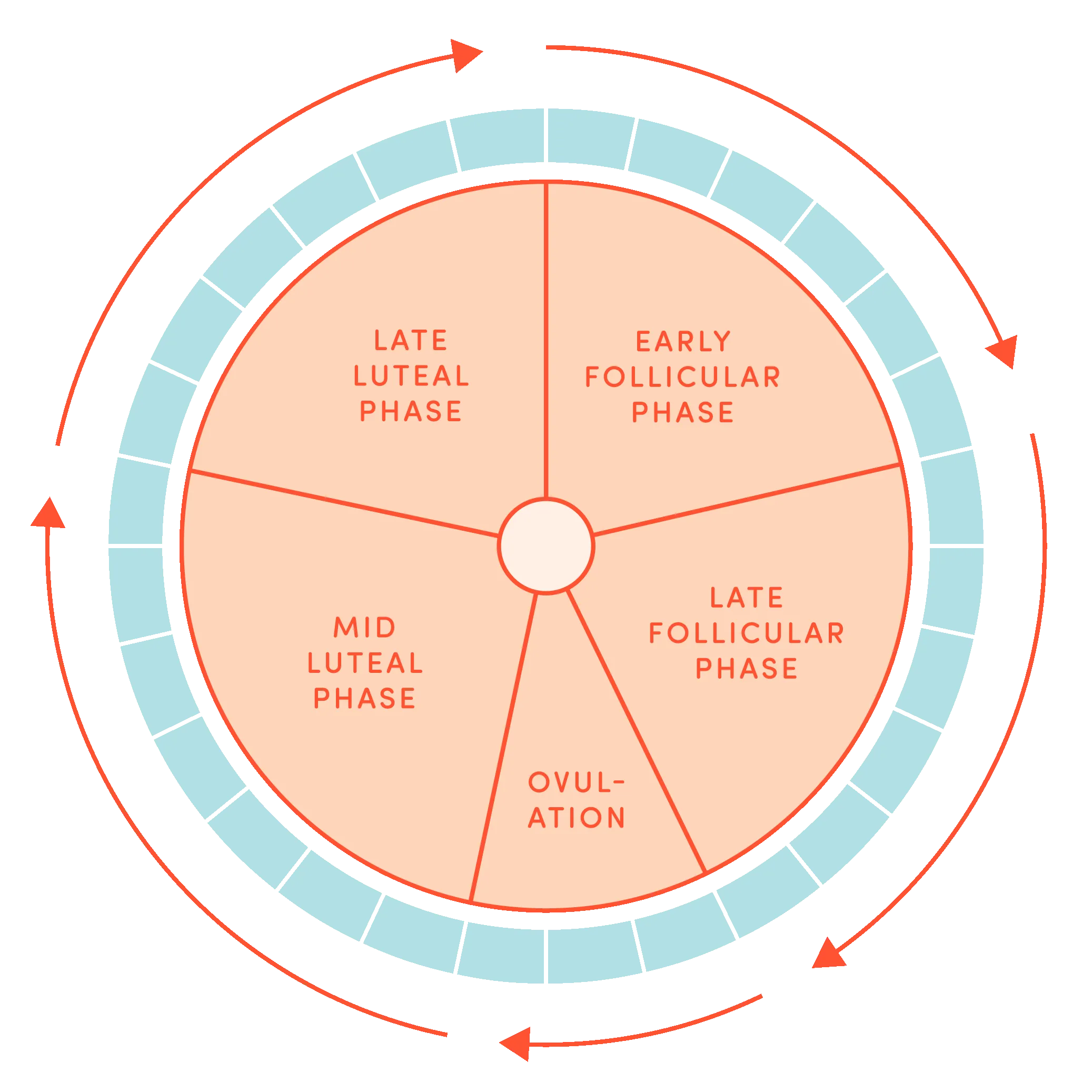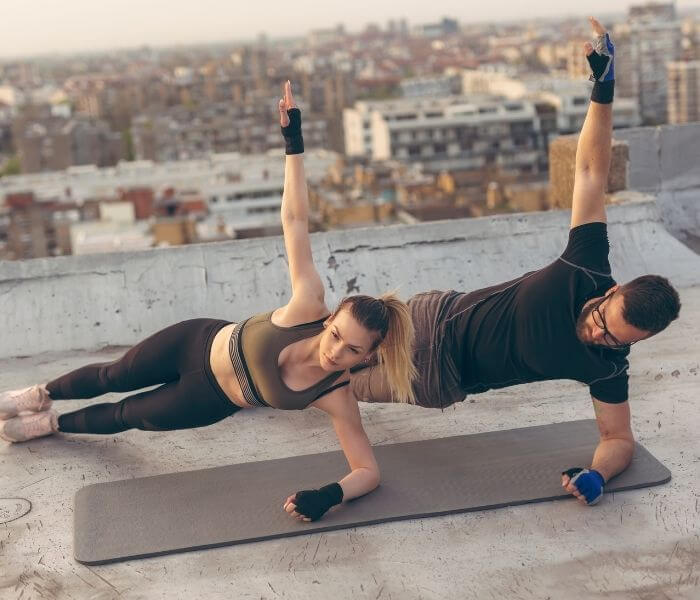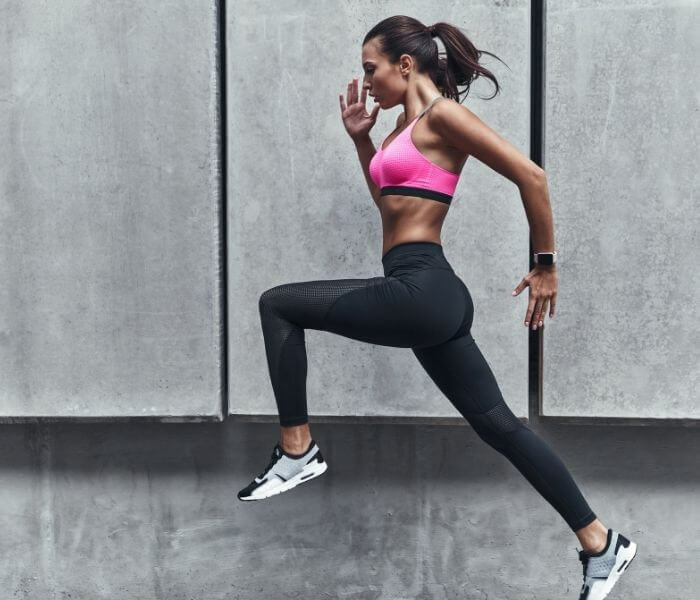7 mins read
Exercise and Your Menstrual Cycle
Author: Dr Natalie Brown
April 4, 2024
Female health

Written by Dr Natalie Brown
Dr Natalie Brown is a Research Associate based at the Welsh Institute of Performance Science, Swansea University, whilst also founding her own consultancy business Optimal Period.
Her research explores the menstrual cycle and sport across all levels of performance, whether that is at the Olympics or helping someone complete daily activity.
Natalie promotes a positive perception of the menstrual cycle in sport, with an importance placed on having a healthy menstrual cycle and finding solutions for reducing or managing symptoms which are affecting exercise participation and sport performance.
Natalie previously worked as a Physiologist and Performance Scientist within elite sport, before returning to complete a PhD in hormonal responses for competition preparation and recovery.
Should you exercise on your period?
As part of the female reproductive life cycle, most individuals will experience menstruation around the time of puberty and will continue, excluding the time during pregnancy, up until menopause which is the time when an individual stops menstruating.
The menstrual cycle is associated with different positive and negative symptoms, unique to everyone, which sometimes can impact on physical activity, training and sport performance.
We have seen this within the research, where elite female athletes report menstrual related symptoms affecting training they complete, missed training or under performance (Brown et al., 2020).
However, the menstrual cycle should not affect your ability to exercise, or perform, and in fact exercise can help reduce menstrual-related symptoms.
So, yes, I always recommend exercising whilst on your period.
Let’s explore this further.
Does my menstrual cycle affect my ability to exercise?
Recently, social media has promoted training around your menstrual cycle to address questions such as ‘when are you weakest in your cycle?’. It has been suggested to focus on different types of exercise and training within different menstrual cycle phases.
Typically, this has included high intensity/HITT, strength and weight training during the follicular phase – a time to train hard.
This compares to an endurance focus and low intensity in the mid luteal phase and yoga, flexibility in the late luteal/very early follicular phase immediately pre and start of a period.
This approach accommodates the shift in metabolism between the phases and also optimises positive symptoms of energy, strength and motivation in the follicular phase that may be naturally experienced compared to tired, lethargic, low motivation, and reduced coordination in the luteal phase.

Image credit: Menstrual Cycle 101 – OptimalPeriod.com
This has its place, taking this approach can work well for some individuals and sports, although no scientific research exists to show changes in acute strength across the menstrual cycle (McNulty et al., 2020; Colenso-Semple et al., 2023).
Sometimes it is not easy or convenient to plan training around menstrual related symptoms and especially not competition timings.
I prefer to shift this narrative to ‘how can we be strong throughout our entire menstrual cycle’ and focus on management and prevention strategies to allow for consistent training and performance…this means you can do squats on your period.
Along with fluctuations in hormone levels, an inflammatory response in the body can cause menstrual related symptoms associated with disturbed sleep, stress and diet.
Therefore you need to understand what and when your symptoms occur to put a plan in place.
To start, track menstrual cycle related symptoms for 3 cycles, tuning in and reflecting on symptoms and feelings.
Alongside this, track any stressful events, stress levels, sleep quality and eating behaviours; i.e. any food cravings, sugar, takeaway, processed foods.
Next is about being proactive. Addressing the cause of the problem, for example tiredness/low energy in the luteal phase; I recommend focussing on sleep quality, recovery strategies between exercise and fueling with food to improve energy levels.
Whereas when you are on your period it might be a focus on how to manage the bleed, I get asked ‘can you run with a pad on?’ and the simple answer is yes.
However, for some individuals, this can be uncomfortable and exploring period product options can be helpful in supporting continued exercise and sport throughout your period. I suggest options such as period pants. These can be great (more comfortable and environmentally friendly) if you prefer not using a product that is inserted, in this instance menstrual cups are brilliant for sport and exercise including swimming.
The benefits of exercising during your period
A key message that is currently missing is how beneficial exercise is to reduce or manage menstrual related symptoms.
Research has shown the positive effect of yoga on reducing menstrual cramps (Kanchibhotla et al., 2023) or light exercise such as walking.
There are also many positive effects of exercise on improving mood, exercise gives you a natural endorphin high alongside a good strategy to reduce stress. Reducing is important as stress increases the severity of symptoms.
There are fears that exercise worsens periods, however, research suggests the contrary and no need to avoid exercise such as handstands, another myth commonly shared!
Do energy levels change throughout your menstrual cycle?
Changes in hormone levels across the menstrual cycle phases cause a shift in metabolism, this refers to the fuel source used within the body to help provide energy to train and exercise.
The body uses glycogen as its primary energy source in the follicular phase.
However, after ovulation, in the luteal phase, fat is the most prominent energy source.
This can cause different exercise types to feel easier or harder at different times of the menstrual cycle. When I am asked ‘do you burn more calories on your period’ the simplest answer is no.
There may be a slight increase in calories you burn during the luteal phase (before your period) when hormones are higher because your core temperature and heart rate can be elevated…this is also why exercise can sometimes be perceived to feel harder. This does not have to negatively affect the type of training and exercise you complete. Remember to plan and be proactive, this is when I focus on diet and nutrition.
The importance of diet
Carbohydrate snacks are key prior to training in the luteal phase to help complete high-intensity training sessions where immediate energy is needed (remember in this phase it is predominate fat for energy which is slow releasing and can make you feel lethargic until you ‘get going’), this could be a cereal bar, banana or malt loaf.
This should allow you to have energy to exercise regardless of the phase of your menstrual cycle. Having carbohydrates around training (before and after) is important and helps provide the energy to complete harder, more intense exercise.
During the luteal phase, the high levels of progesterone can cause the breakdown of proteins in the body which slows recovery and reduces training adaptation.
Rather than avoiding training during the luteal phase, ensure protein intake with each meal (every 3-4h). Aim for 20g of protein per meal e.g. 1 chicken breast.
A good protein intake can also reduce food cravings (usually sugar and processed foods which can also increase related symptoms).
Finally hydration, this can help with bloating and other gastrointestinal related symptoms. Aim to have 6-8 glasses of water a day or have a drink bottle (1.5l) throughout the day.
How too much exercise can be bad
A regular menstrual cycle is super important, it indicates a good energy balance, and that the body’s hormones and reproductive system are working well.
With increasing volumes and/or intensity of training and exercise it is important to ensure energy intake (food) meets the energy demands (not just exercise but all of your body functions to keep you healthy).
Where there is an energy imbalance this has been named Relative Energy Deficiency in Sport (REDs).
REDs can have a negative impact on health and performance, with periods becoming irregular or stopping as 1 indicator of this.
As part of a balanced diet, fuelling training is essential for your health and performance.
Have a carbohydrate-containing meal 4 hours before exercise, you may need another carbohydrate snack 2 hours before training (I like to have a banana or malt loaf).
During high-intensity (>45mins) or low intensity (>75mins) exercise, include quick release carbohydrates (my go to is harribo or gels!) and finally carbohydrates within 30mins of finishing training (milkshake or yogurt and fruit).
This will give your body the fuel to recover and can help you avoid overtraining.
Listen to your body
Whilst working this all out, training may need to be adjusted.
However, longer term, by focussing on preventing/managing symptoms and maintaining physical activity levels it will help you to train and perform consistently whilst improving health and wellbeing.
Tune in, make a plan and be proactive – adding strategies to perform consistently across your menstrual cycle. It is not always possible to get it right, I still sometimes don’t when work gets stressful.
I use my menstrual cycle as my indicator that I am not actively managing other life activities and use this to my advantage to check in and address increased stress, poor diet, reduced sleep etc. If you experience any symptoms that you are struggling with, speak to your coach or gym trainer – it’s not something to ignore, struggle or persevere with!
- Health scores calculated
Close
Related articles
Like this article? Here are some more based on similar topics.






